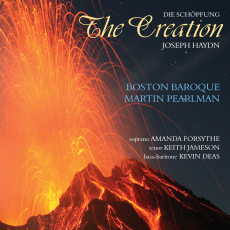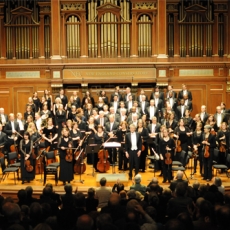Boston Baroque - Haydn Creation - Fanfare Magazine
Boston Baroque, which had not been heard on silver disc since their last Telarc release in 2010, has now reappeared on the Scottish audiophile label Linn. If the warm, slightly opaque sound, with soloists well forward sounds familiar, a perusal of the production team will quickly reveal why. Michael Bishop, Robert Friedrich, and Thomas C. Moore are in the control booth: it's just like old times. Well, not quite old times; Robert Woods and Jack Renner, the geniuses behind the classic Telarc sound, have been gone since 2005. The sound of Boston Baroque recordings has suffered a bit since then, in part because the acoustic of now preferred Boston's Mechanics Hall is nicer to hear in person than to record in. Still, it is more than acceptable, especially if detail and presence in the tutti sections is less important than blend and burnish.
Boston Baroque, formed by music director Martin Pearlman in 1973 as Banchetto Musicale, is one of the pioneering period-instrument ensembles in the U.S. and the oldest such ensemble still actively performing. Premieres claimed include the first period-instrument performance in Boston of Haydn's The Creation in 1989 (unless we count the 1819 American premiere of the work in Boston by the Handel and Haydn Society, which presumably was on period instruments). This recording was made just prior to a pair of live performances in October 2011. Reviews of the event enthused over Martin Pearlman's deft handling of the score-the perfect combination of lightness of touch and drama-as well as the balance and accuracy of the chorus, and the artistry of the authentically sized instrumental ensemble. Some point is made in the program notes of the range in size of Haydn's own performing groups when he led the work. Pearlman employs an orchestra of 40 and a chorus of 25. While Haydn did lead ensembles of about this size, he most often led larger ones. Paul McCreesh has recently recorded a re-creation of the 1799 public premiere on the Archiv label using three times Boston Baroque's number.
The press assessment of the quality of the execution is spot on. Pearlman and his forces produce a performance of great dramatic force without skimping on its charm. Dramatic points are made without exaggeration, and Pearlman, who has on occasion been accused of excessive speed, manages to move things along at a good pace-96 minutes when 100 or more is the norm-without sounding rushed. The humorous musical characterizations, such as of the newly created animals, have been done elsewhere with a bit more imagination and point, but even there some may thank him for his restraint. This performance joins my period-instrument favorites by Harnoncourt (Harmonia Mundi), Gardiner (DG), and McCreesh, each of which illuminates Haydn's masterpiece in telling ways.
The three soloists second Pearlman's strengths, with unexaggerated performances of thrilling virtuosity. Amanda Forsythe is an immediately appealing Gabriel. Her warm focused tone and light, rapid vibrato exude a Lucia Popp-like joy in the creation and in singing. Her handling of the coloratura is nearly as effortless as that paragon's, with trills nicely placed. Kevin Deas's elegant projection of the text and his rich bass-baritone with its easy top and powerful but never heavy bottom-all the way down to the resonant interpolated low D-brings to mind Kurt Moll in the role of Raphael. Keith Jameson has the perfect bright, colorful tenor voice to blend into the trio without getting lost in the middle, and he delivers Uriel's solos stylishly. Running counter to current trends, Pearlman also has Forsythe and Deas sing the small roles of Adam and Eve, as was the practice in Haydn's time.
A delightful performance that transcends a good but not perfect production.

